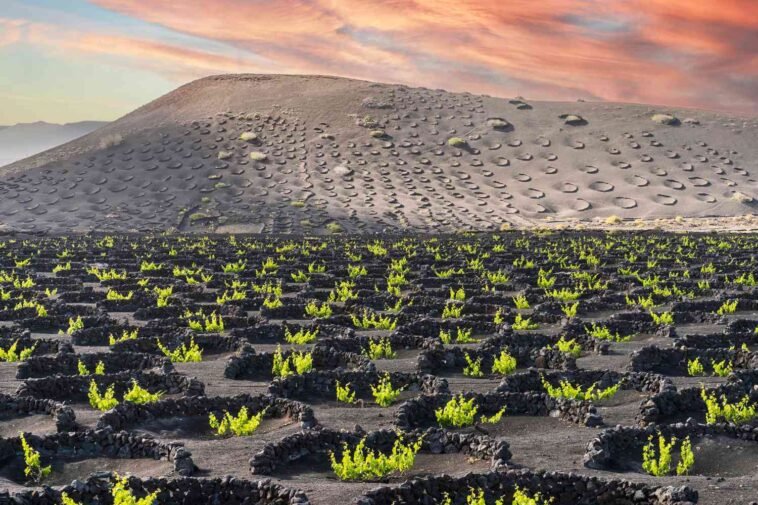Lanzarote Island, nestled within Spain’s Canary Islands, boasts an extraordinary winemaking tradition born from generations of resilience and resourcefulness. Here, amidst the dramatic landscape shaped by volcanic eruptions, lies a unique method of wine production that has captivated enthusiasts worldwide.
At first glance, the vineyards of Lanzarote appear stark and desolate, with the jet-black terrain punctuated by cone-shaped hollows resembling the imprints of some ancient giant. Yet, upon closer inspection, each crater reveals a thriving vine at its core.
Situated just 127 kilometers off the coast of Africa, Lanzarote is renowned as the “Volcano Island,” distinguished by its more than 300 volcanic vents. The island’s tumultuous past, marked by eruptions such as those in 1730, has shaped its landscape into a hauntingly beautiful tableau reminiscent of an alien world.
The aftermath of the 1730 eruptions left a quarter of the island covered in lava, displacing villages and devastating crops. However, amidst the destruction emerged a hidden potential—the fertile soil enriched by layers of volcanic ash, locally known as picón.
While winemaking has been a part of the Canary Islands’ history since Spanish colonists first arrived in the 15th century, it was the ingenuity of Lanzarote’s inhabitants that transformed the island into a wine-producing powerhouse. Faced with the challenge of cultivating crops in an arid environment with minimal rainfall, they turned to grapevines, harnessing the unique properties of the volcanic soil to nurture their vineyards.
The key to Lanzarote’s winemaking success lies in the hoyos, or conical hollows, meticulously crafted to cradle each vine. These three-meter-wide craters not only capture scarce moisture from rain and dew but also harness the picón to regulate soil temperature and retain moisture—an ingenious solution to the island’s harsh climate.
Despite the formidable challenges posed by relentless trade winds and occasional dust storms, Lanzarote’s winemakers persevere, driven by a deep connection to the land and a commitment to preserving its rich viticultural heritage.
For young winemakers like Daniel Martín, who returned to his native Lanzarote after honing his craft in Spain’s mainland, the wines produced here are more than just beverages—they embody the resilience and dedication of the local community. Alongside fellow enologists like Raúl Pérez, Martín represents the next generation of winemaking talent poised to carry Lanzarote’s legacy into the future.
As Lanzarote’s winemaking industry continues to evolve, fueled by a newfound appreciation for its unique terroir, challenges such as climate change loom on the horizon. Yet, if history is any indication, the island’s vineyards will adapt and thrive, a testament to the enduring spirit of innovation and perseverance that defines Lanzarote’s winemaking tradition.



GIPHY App Key not set. Please check settings